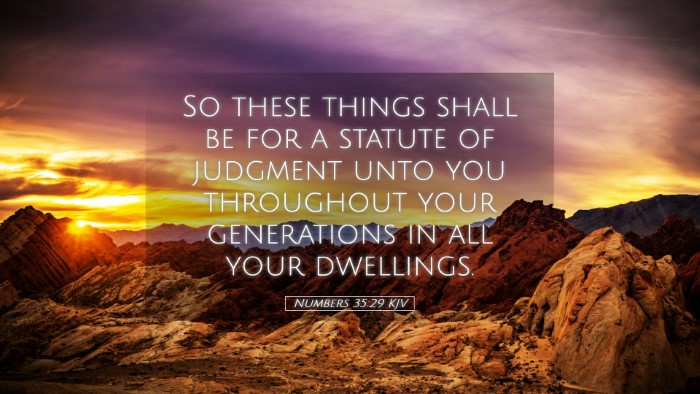Commentary on Numbers 35:29
The verse Numbers 35:29 states: "These things shall be for a statute of judgment unto you throughout your generations in all your dwellings." This verse highlights the importance of judicial statutes and their enduring relevance in the community of Israel.
Contextual Background
The Book of Numbers serves as a record of Israel's journey and their establishment as a covenant community under God’s laws. Chapter 35 primarily deals with cities of refuge and the laws pertaining to manslaughter and murder, illustrating God’s concern for justice and mercy.
Theological Insights
In this verse, we can see a reaffirmation of the divine mandate for justice that God instills within the community. The statutes set forth in this chapter are not merely for the present generation but are established as a lasting principle for all future generations.
Justice and Mercy
Albert Barnes emphasizes that the maintenance of justice reflects God's character. The laws concerning cities of refuge illustrate a balance of justice and mercy. They ensure that while the sanctity of life is maintained, there is also a provision for the accidental killer who did not intend to take a life. Thus, God’s justice is tempered with mercy, showing His care for human frailty.
Legacy of Legal Statutes
Matthew Henry notes that the commandment to remember these judgments is crucial for the community’s social fabric. The perpetuation of these statutes is essential not only for the contemporary society but also for establishing a legacy that carries through all generations. The continuity of such laws reflects the timeless nature of God's word and His justice.
Application for Pastors and Theologians
This verse carries profound implications for contemporary pastoral practice and theological reflection. Here are a few insights:
- Justice in Ministry: Pastors are called to embody and promote justice within their congregations, ensuring that community life reflects God’s impartiality and care.
- Understanding of Refuge: Just as cities of refuge were a provision for those in need, the church today is called to be a place of refuge and healing for the broken and the marginalized.
- Legacy of Faith: The role of leaders in teaching and ensuring the continuation of God’s laws is paramount, encouraging future generations to uphold divine statutes in their lives.
Historical Perspective
Adam Clarke provides an historical lens through which we can understand the practices of ancient Israel. The appointment of cities of refuge was crucial for a society that placed high value on life and familial relationships. This legal structure acted as a societal safeguard, rooted deeply in the covenantal relationship between God and His people.
Sociopolitical Implications
The establishment of such legal provisions served not only spiritual purposes but also aimed to create an orderly and just society, crucial for the welfare of the Israelite community. When leaders uphold such statutes, they create a foundation for peace and security, vital for communal living.
Final Reflections
The lasting significance of Numbers 35:29 embodies the essence of God’s laws, reflecting His unwavering commitment to justice across generations. It serves as a reminder that while contexts may change, the principles of justice, mercy, and community stability remain ever relevant and necessary.
In sum, those who are tasked with teaching or living out these principles have a significant role in shaping both current and future generations in the way of righteousness and compassion.


